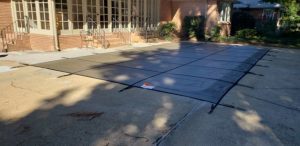The Importance of Pool Safety Covers
The joys of owning a swimming pool are vast, from relaxed dips on hot summer days to energetic pool parties with friends. But with this luxury comes a key responsibility – safety. One aspect that often gets overlooked is pool safety covers. They aren’t just functional, but a crucial element that can protect lives, save money, and keep your pool in tip top shape.
Understanding Pool Safety Covers
What exactly are pool safety covers? Simply put, they are strong, protective barriers that can be installed over the surface of a pool. Available in a variety of materials and designs, they can be manual, semi-automatic, or automatic, each with their own set of advantages.
Pool safety covers serve a dual purpose – they deter accidental entry into the pool while maintaining pool quality. They are tailored to fit your pool’s shape and size, providing an effective and reliable solution for pool safety and maintenance.

Importance of Pool Safety Covers
Safety
The paramount reason to consider pool safety covers is to enhance safety. They form a robust barrier that prevents accidental falls, thus reducing the risk of injuries and unfortunate drownings. Furthermore, these covers are a godsend if you have pets or if wildlife often visits your backyard, ensuring their safety around the pool.
Maintenance and Convenience
In addition to safety, pool safety covers significantly reduce the amount of debris that enters your pool. This means less time spent skimming leaves off the water surface and a potential reduction in the frequency of professional pool cleanings.
These covers also protect your pool from the whims of weather. Harsh sunlight, rain, snow – your pool will be shielded from these elements, preserving your pool’s integrity and cleanliness.

Energy and Cost Efficiency
Pool safety covers are an investment that can pay for themselves over time. They significantly reduce water evaporation, helping conserve water. They also maintain pool temperature, meaning you spend less on heating costs.
The protective features of a pool safety cover can extend the lifespan of your pool, saving you money on major repairs or replacements in the long run.
Selecting the Right Pool Safety Cover
When it comes to choosing a pool safety cover, several factors come into play. The size and shape of your pool, the local climate, and your budget are just a few considerations.
Measuring your pool for a safety cover can be a complex task. It’s not just about length and width; you need to factor in steps, ladders, and other pool features. Professional help is recommended for this task to ensure a perfect fit.
Pool Safety Cover Installation and Maintenance
Installation of a pool safety cover is a process best left to professionals. It involves careful measurement, precise installation, and a keen understanding of the pool’s structure.
Like any pool accessory, safety covers require regular maintenance and inspection. Check for wear and tear, clean the cover regularly, and ensure it’s properly secured when in use. These steps will help prolong the cover’s life.

Legal Requirements and Regulations
In some regions, safety standards and regulations mandate the use of pool safety covers. Besides, having one can have legal benefits like positively affecting your homeowner’s insurance. It’s crucial to understand and adhere to these regulations for your region.
Conclusion
Investing in a pool safety cover is a decision that pays dividends in the long run. Beyond the evident safety features, it simplifies maintenance, increases energy efficiency, and even meets legal requirements in certain areas. So, don’t think of it as an unnecessary expenditure but as an investment in safety, convenience, and peace of mind.
Don’t wait until it’s too late. Get a pool safety cover today and enjoy your pool with the confidence of knowing that it’s a safer place for everyone. For more information on safety covers and professional installation, please feel free to contact us.



